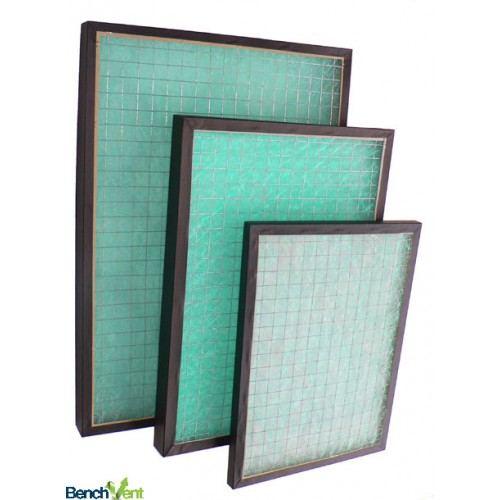
Pack of 6 particle filters IFA3. For general spray and dust particle capture.
For use with BenchVent units :
BV300S (A300S), BV200H (A200H), BV200H-D (A200H-D), BV300S-D (A300S-D), BV660H-C (T660H-C), BV500S-D (T500S-D) and BV660H-D (T660H-D).
Size: 495x372x23mm
Disclaimer :Strike Force Hobbies recommends following the proper protocol(s) / caution and wear a respirator when spray painting.
FAQ :
Particulate filter: In the case of the particulate filter the filter life is dependent on use. We do recommend that in most cases they should be changed at least every two months.
Carbon Filter: This is a time dependent as well as usage. This is because the carbon in the filter will adsorb moisture and other gases from the atmosphere even when the units are not being used. We do recommend that they should be changed every 6 months as a minimum.
Washable filters are great as grease filters in cooker hoods and kitchen situations. They also have limited use in some situations where “sticky” solutions are being used. BenchVent does not use, or recommend washable filters.
When do I know that the BenchVent filters need changing?
Particulate filter: At the moment, BenchVent units do not have airflow indicators. These will be installed in the near future. The best way to check is by way of a visual check – are the particles being taken into the filter; or by offering an A4 piece of paper close up to the filter. The paper should be drawn up to the filter within a Centimetre or so and should remain there unaided. If it drops off, then the filter needs to be replaced.
Charcoal and Carbon filters: These filters need to be changed every 6 months regardless of use as they absorb moisture and other contaminants from the surrounding atmosphere on a daily basis.This is as a minimum requirement. If the unit is in constant use Filter(s)will need to be replaced more often.
In most cases it should be possible to discard of the filters with the general waste. However in certain cases; such as Pharmaceutical and Lab use, the contaminants may be required to be disposed of as hazardous material. We always suggest that you consult your waste disposal policy and or your local council environment office to see if there are specific requirements in place.